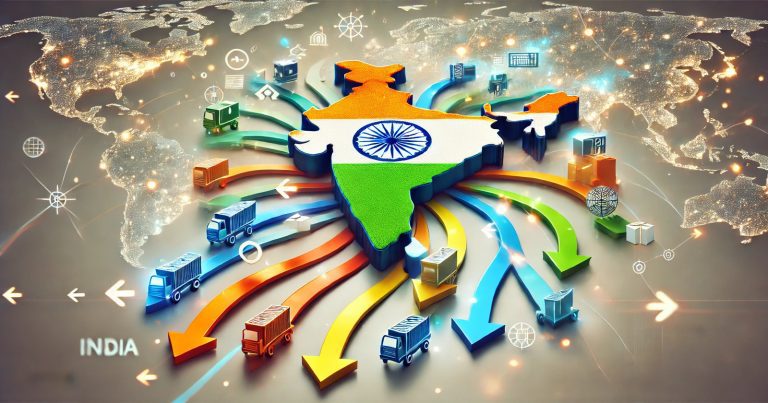The advantages of export are profit maximization, expansion, and the development of global markets. Exporting allows a firm to sell its products and services in international markets, leading to high sales and long-run growth. The countries benefit through export as the country’s economy is developed and more employment and governmental involvement are gained in other global affairs. Export businesses will enjoy a more significant consumer base, diversify risk, and gain competitive advantage. This article will cover various aspects of exporting, including export trade, eligibility for exports in India, the benefits of exporting, and the major exports of India. Understanding these topics will help businesses and individuals looking to enter the export business and grow beyond domestic markets.
What is Exporting?
Exporting is the selling of goods or services to buyers in another country. It is essential to import and export trade, allowing businesses to reach foreign markets. Companies involved in export trade manufacture products in one country and ship them to another, following international trade laws and regulations.
Understanding Export Trade
The export trade process has several steps. A business first identifies the potential markets and customers. Then, it meets export documentation requirements such as licenses, invoices, and shipping documents. After fulfilling all the formalities, the goods are transported to the importing country through air, sea, or land routes. Exporting can be categorized into two types:
- Direct Exporting – The seller sells products directly to foreign customers. It provides greater control over price and brand.
- Indirect Exporting – The seller uses export agents, trading companies, or distributors to sell products in the foreign market.
The success of an export business depends on market research, government policies, and trade agreements between countries. Proper planning helps companies expand internationally and reap the benefits of exporting.
Who Can Export Goods from India?
Any business or individual in India can export if they fulfill the legal requirements. The government has designed a systematic process to ensure hassle-free international trade.
Eligibility for Export Business in India
- Registered Business – Any individual, sole proprietorship, partnership firm, private limited company, or LLP can apply for an export license and start exporting.
- Import-Export Code (IEC) – IEC is a license issued by the Directorate General of Foreign Trade. Without an IEC, one cannot export any products.
- GST Registration – A business must obtain a GST registration to abide by the tax policies
- Exporter Registration– Companies need to register with the Export Promotion Council of the concerned industry.
- Export Documentation – Proper documents, including commercial invoices, bills of lading, and certificates of origin, ensure fair trade.
Role of the Government in Exporting
The Indian government provides incentives, tax benefits, and trade agreements for exporting companies. Organisations like the Federation of Indian Export Organisations (FIEO) and the Export Credit Guarantee Corporation (ECGC) assist Indian businesses in reducing risks and making their export business profitable.
Benefits of Exporting
Exportation benefits corporate ventures, economies, and customers as a whole. Export trade helps businesses reach more consumers, earn more profits, and increase brand reputation.
Access the Global Markets
Exports give a firm access to a more extensive customer base than domestic markets. Companies can explore economies, consumer preferences and demand patterns differently through international trade.
For instance, an Indian textile company selling fabrics to Europe enjoys a much larger audience with less dependence on local demand. This helps keep businesses stable in times of an economic downturn back home.
Higher Revenue and Profits
Exporting allows companies to generate foreign currency and take advantage of price variations in overseas markets. Products can be sold at higher prices in other countries than in the domestic market, resulting in higher revenue and more significant profit margins.
For example, Indian software firms sell IT products to overseas clients at lower prices in dollars or euros, and that often has better exchange rates. Tell considerably increases profit and economic strength.
Competitive Advantage and Brand Recognition
Export trade makes export firms more competitive than commercial trade enterprises. Export trade creates a reputatiobrand’s reputation globally, increasing the brand’s credence and good. Will Infohasaave be able to export its business to India and become the most trusted brand in the global market?Businesses that are recognized as exporters can attract more clients and investors when they have built a reputation.
Risk Diversification
Export business reduces the dependency on a single market. An exporter will continue to produce and sell when there is a recession in the home market.
During India’s recession, pharma companies that export medicines to the US and Europe continue to enjoy profitability despite falling domestic demand. This is a merit of export, as a company can survive market fluctuations and stabilize.
Employment Generation and Economic Growth
The benefits of exports beyond businesses to the economy. Exporting industries create jobs, thereby increasing economic development. Manufacturing, logistics, packaging, and supply chain operations expand as businesses begin global trade.
Textile and India’s IT industries have created millions of jobs due to a strong export business. More employment opportunities arrive as demand for goods in Indian countries increases, thereby improving the country’s health in terms of finance.
Apart from the above main benefits, many more benefits of exporting play their part in business expansion, economic growth, and long-term stability. Exporting is not only a source of direct financial gains but also fosters innovation, creates cross-border relationships, and strengthens supply chains. Here are four more main merits of exporting that businesses and economies can utilize.
Encourages Innovation and Product Development
Exporting encourages businesses to innovate their products and services at the international level. Companies venturing into foreign markets must compete with global brands. Therefore, the quality, efficiency, and technology used in products and services improve.
For instance, Indian automobile manufacturing firms competing with companies from Europe and Japan must continually design automobiles with fuel efficiency and safety features. In the end, it all results in better products for local consumers as well as international consumers.
Innovation also allows companies to adapt their products to fit other markets. An organization selling foodstuffs may alter ingredients or packages according to consumer needs in different countries. Flexibility enhances loyalty and penetration of the brand.
Deepens Diplomatic and Trade Relations
International trade builds the diplomatic ties of countries. Exporting products from one country to several others promotes positive trade relationships, usually resulting in cooperation and strategic alliances. Strong trade ties usually lead to reduced tariffs, better trade agreements, and easy market access.
For example, considering the rising exports from India to the US, Europe, and Southeast Asia, many free trade agreements for Indian exporters have been entered. Such agreements eradicate trade barriers. Firms carry out their activities in international markets without levies or tariffs.
Exporting also increases cultural exchange as individuals from various countries can share and embrace other’s products. This enhances international exposure of other companies, which, in turn, increases the goodwill among the nations.
Promotes Business Stability and Permanence
Companies that rely on local sales are more prone to risks from economic recession, seasonal trading, and changing customer preferences. Exporting reduces the risks since various income streams exist from dddifferentarkets
For example, an Indian company manufacturing winter clothing may face low sales in India during summer. However, exporting to colder countries ensures year-round demand for its products. Similarly, a business affected by a recession in one country can still generate profits from other stable markets.
Exporting business enables companies to obtain a long-run international presence. Long-term long-term territory for a business increases its reputation, interest in global investors, and the chances of more funding while expanding.
Enhances Supply Chain and Production Efficiency
Export trade activities force businesses to organise their supply chain and boost production efficiency. If companies export items, they should have optimised supply chains, save costs, and ensure timely supplies are competitive globally.
For instance, for Indian pharmaceutical firms supplying drugs to the US and Europe, there is the aspect of on-time delivery and excellent quality products. They may have to adopt leading-edge manufacturing technologies and the practices of efficient inventory management and professional logistics service providers. Export ion encourages firms to have good friendly relations with their suppliers in the ordinance on a single market.
Therefore, a diversified supply chain will serve diversified source regions for raw materials and parts, with the tariffs associated with shortages or price fluctuations.
Major Significance of Indian Exports
India is the world’s second-largest exporter, with an expansive portfolio of diversified commodities exported to foreign shores. Most Indian exports bring about quite a huge change, which is considered to be the cause of India’s GDP and trade surplus. Key Export Industries in India
- Textiles and Apparels – India exports cotton, silk, synthetic fabrics, and ready-made garments to Europe, The US, and the Middle East
- Pharmaceutical – India is the largest exporter of generic medicines, supplying quality cheap drugs to markets worldwide.
- Gems and Jewelleries – The country exports diamonds, gold jewellery, and precious stones mainly to the US, UAE, and Hong Kong.
- Automobiles and Auto Components – Bikes and spare parts from India are exported to Africa, Latin America, and Europe.
- IT and Software Services – Indian software companies serve major companies in software development, cybersecurity, and cloud solutions.
- Agricultural Productsignificantficantin agriculture products include include rice, spices, tea, and seafood, and they are sold in countries such as the US, China, and the Middle East.
Strategy of Growth for India Export
The Indian government provides incentives such as the Merchandise Exports from India Scheme (MEIS) and the Export Promotion Capital Goods (EPCG) scheme to increase exports. Free trade agreements with many countries have also increased India’s export potential.
Indian exporters must produce quality, adhere to international standards, and follow global trade pol: strong logistics networks and better digital infrastructure further increase the country’s export potential.
Benefits of Exporting FAQs
1. What is export trade?
Export trade is transporting goods and services from one country to another. It helps businesses expand internationally, earn foreign revenue, and contribute to economic growth. Exporting involves trade regulations, export documentation, and compliance with international standards.
2. What are the benefits of eexportingto business?
The benefits of exportation are higher sales, international brand name recognition, comparative advantages, and risk diversification. Companies that are engaged in the export trade have more profits, foreign market opportunities, and protection from downturns in their domestic economies.
3. How do I start an export business in India?
To begin an export business in India, one must register a company, obtain an Import-Export Code from DGFT, complete export documentation, and follow international trade laws. Finding profitable markets and using government support schemes can help exporters succeed.
4. What are the benefits of export business in India?
The advantages of export business in India are the generation of employment generation generation, change business expansion and economic development. The Indian government also supports exporters by providing incentives and policies for global trade.
5. What is an export license, and why is it important?
An export license is a form of legal permission needed to sell nationally. It facilitates tbusinesses’ compliancewith trade regulations, quality standards, and customs procedures in foreign markets.


